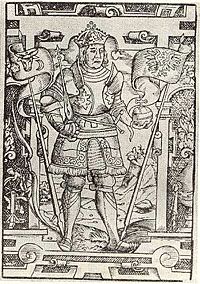John I Albert of Poland
| John I of Poland | |
 |
|
| Presumed likeness of John I Albert on engraving, early 16th century | |
| Reign | 1491-1498 (Grand Duke of Lithuania) 1492-1501 (King of Poland) |
|---|---|
| Born | December 27, 1459 |
| Birthplace | Kraków, Poland |
| Died | June 17, 1501 (aged 41) |
| Place of death | Toruń, Poland |
| Buried | Wawel Cathedral, Kraków |
| Consort | Elisabeth of Austria |
| Royal House | Jagiellon |
| Father | Casimir IV of Poland |
| Mother | Elisabeth of Austria |
- For other monarchs with similar names, please see John of Poland.
John I Albert (Polish: Jan I Olbracht; 27 December 1459 – 17 Jun 1501) was King of Poland (1492 – 1501) and Duke of Głogów (1491 - 1498).
Contents |
Life
John was the third son of Casimir IV Jagiellon, King of Poland, and Elisabeth of Austria, daughter of Albert II of Germany. As crown prince, he distinguished himself by his brilliant victory over the Tatars at Kopersztyn (1487). In 1490, the Hungarian nobility proclaimed John King of Hungary at the Rákos diet. He was, however, defeated by his brother, King Ladislaus II of Bohemia and Hungary. In 1492, John succeeded his father as King of Poland.
Losses of revenue due to the secession of Lithuania placed John at the mercy of the Polish sejmiks, or local diets, where the szlachta, or local nobles, made their subsidies dependent on the king's subservience.
John desired to pose as the champion of Christendom against the Ottoman Turks. Circumstances seemed, moreover, to favor him. In his brother Ladislaus, who as King of Hungary and Bohemia possessed a dominant influence in central Europe, he found a counterpoise to the machinations of Emperor Maximilian I, who in 1492 had concluded an alliance against him with Ivan III of Muscovy. As suzerain of Moldavia, John was favorably situated for attacking the Turks. At the conference of Leutschau (1494), the details of the expedition were arranged between the kings of Poland and Hungary and Elector John Cicero of Brandenburg, with the co-operation of Stephen III of Moldavia, hospodar of Moldavia, who had appealed to John for assistance.
In the course of 1496 John collected an army of 80,000 men in Poland with great difficulty, but the crusade was deflected from its course by the sudden invasion of Galicia by the hospodar, who apparently — for the whole subject is still very obscure — had been misled by reports from Hungary that John was bent upon placing his younger brother Sigismund on the throne of Moldavia. Whatever the reason, the Poles entered Moldavia not as friends but as foes, and after the abortive siege of Suceava were compelled to retreat following defeat at the Battle of the Cosmin Forest. The insubordination of the szlachta seems to have been one cause of this disgraceful collapse, for John after his return confiscated hundreds of their estates; in spite of which, to the end of his life he retained his extraordinary popularity.
When the new Grand Master of the Teutonic Knights, Friedrich Wettin von Sachsen, refused to render homage to the Polish crown, John compelled him to do so. His intention to still further humiliate the Teutonic Order was stymied by his sudden death in 1501.
Ancestors
| John I Albert of Poland | Father: Casimir IV Jagiellon |
Paternal Grandfather: Jogaila |
Paternal Great-grandfather: Algirdas |
| Paternal Great-grandmother: Uliana Alexandrovna of Tver |
|||
| Paternal Grandmother: Sophia of Halshany |
Paternal Great-grandfather: Andrew of Halshany |
||
| Paternal Great-grandmother: Alexandra Drucka |
|||
| Mother: Elisabeth of Austria |
Maternal Grandfather: Albert II of Germany |
Maternal Great-grandfather: Albert IV, Duke of Austria |
|
| Maternal Great-grandmother: Johanna of Bavaria, Queen of Bohemia |
|||
| Maternal Grandmother: Elisabeth II of Bohemia |
Maternal Great-grandfather: Sigismund, Holy Roman Emperor |
||
| Maternal Great-grandmother: Barbara of Celje |
See also
- History of Poland (1385-1569)
- Piotrków Statutes
References
- V. Czerny. The Reigns of Jan Olbracht and Aleksander Jagiellon. Kraków, 1882. (Polish)
This article incorporates text from the Encyclopædia Britannica Eleventh Edition, a publication now in the public domain.
| Preceded by Casimir IV |
King of Poland 1492–1501 |
Succeeded by Alexander |
|
||||||||||||||||||||||||||